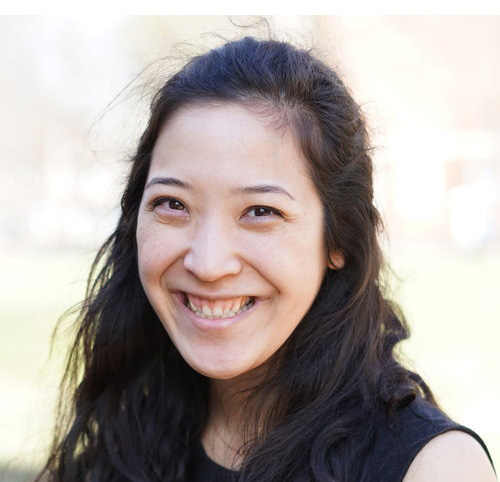Naomi Miyake is a 4th-year PhD student in the Department of Chemical Engineering. Her dissertation research is focused on catalysts for application in making the chemical, 1,3-butadiene (used for the production of tires) from ethanol. Currently, butadiene is made as a by-product of an oil refining process, but in recent years, many large chemical companies based in U.S. and Europe are transitioning to using ethane instead of oil to make many products. Therefore, there is a growing interest in an alternative method for the large-scale production of butadiene that is not dependent on oil. The feasibility and sustainability of the alternative method on an industrial scale rely on the design of an efficient, low-cost catalyst.
Naomi has participated in the Communicating Research and Career Design modules of PhD Plus. She is currently the president of Christian Students at UVA and the Graduate Society of Women Engineers, and also serves as the co-academic chair for the Graduate Engineering Student Council. Using her connections in the School of Engineering and Applied Sciences, she has focused on raising awareness of PhD Plus events and tailoring research communication events to be relevant for her peers in Engineering programs. After focusing on her current research goals, Naomi aspires to transition into a research management role post-PhD.
Q: Why did you apply for the PhD Plus Liaisons Program?
A: I liked the concept behind the PhD Plus program, as it addresses concerns I hear from other graduate students regarding their professional development outside of research domains. The University’s support of PhD Plus program is vital because it indicates that UVA is responding to the feedback provided by senior graduate students and recent PhD alums.
In particular, the role of Research Communication Liaison spoke to me because during my time at UVA; I have always looked for opportunities to develop my skills in this area. Since my foray into the world of Chemical Engineering during my undergraduate training, I have been surrounded by the stigma that engineers are not effective communicators. Although some are naturally eloquent, I believe we can develop effective communication skills through key training. The role of Research Communication Liaison aligned with my desire to increase opportunities for engineers to improve their research communication skills, instead of living with the stigma that engineers cannot communicate well. Due to my involvement in several different organizations within the School of Engineering and the strong relationship with my department, I am well-positioned to connect the Engineering school-wide perspective to PhD Plus program as a Liaison.
Q: What are you doing as a PhD Plus Liaison in the context of your department and “Communicating Research” area of focus?
A: Together with other Research Communication Liaisons, we are planning a two-and-half day science communication conference, ComSciCon at UVA in fall 2020. Each of us is planning topic-specific workshops such as story-telling and writing for non-scientific audiences. We are also compiling a list of relevant resources associated with the workshop topics for participants. Finally, I was able to set up a time to talk to PhD students in the first year in my department about PhD Plus and workshops and seminars they may be beneficial or of interest to them.
Q: What professional skills are you developing as a PhD Plus Liaison?
A: Learning to communicate my research, as well as how to teach communication skills. In particular, having to lead a workshop led me to reconsider my work. Even in crafting an email, I find myself considering whether the language is appropriate, direct, clear, free of jargon, and so on. Overall, I believe that participating in Liaison’s program has improved my communication skills, which will be a life-long asset to me.
Although each Liaison took leadership in proposing and planning separate workshops, receiving feedback from fellow liaisons was helpful. In planning ComSciCon, it was helpful working with fellow liaisons from different STEM departments who brought a variety of perspectives. There were several different directions ComSciCon could have taken, so it was a process and learning experience on how to effectively communicate interpersonally to effectively plan the event and try to incorporate as many ideas as possible.
ABOUT PHD PLUS LIAISONS PROGRAM
The primary role of the PhD Plus Liaisons is to bring the professional training provided by the broader program into specific disciplinary/departmental contexts and to communicate the needs of specific departments and disciplines back to the broader program. Liaisons communicate with students and faculty in their home departments about their peers’ professional development needs, helping to gather departmental feedback to be used for the development and improvement of the program and conferring with liaisons in other departments across the University of Virginia. In addition to supporting their fellow graduate students and informing the continued evolution of the PhD Plus Program, Liaisons themselves benefit from sustained access to training, mentorship, and support in a professional focus of their choosing.
ANNOUNCEMENT
Over the following months, PhD+ Liaison highlights will provide an opportunity to get to know the Liaisons for Academic Year 2019-2020. Learn more about these PhD student leaders, why they decided to participate in PhD Plus Liaisons program, their professional development goals, and how they are collaborating with the PhD Plus program and their departments.
We will open the Call for 2020-2021 Applications for the Liaisons Program in Spring 2020.

